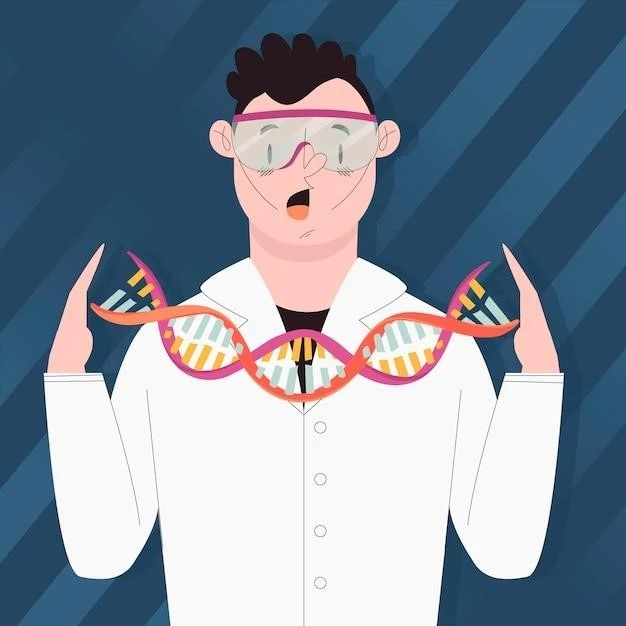Understanding Monosomy 6q2 and Chromosome 6 Abnormalities
Monosomy 6q2⁚ Definition and Explanation
Monosomy 6q2 is a rare chromosomal abnormality characterized by the deletion of a portion of the long arm of chromosome 6․ This deletion affects the genetic material in the region known as 6q2, leading to the loss of crucial genes․

Individuals with monosomy 6q2 typically have one copy of chromosome 6 instead of the usual two copies․ This genetic imbalance can result in various developmental delays and congenital anomalies․
The deletion in chromosome 6q2 can impact the individual’s physical and cognitive abilities٫ depending on the size and location of the missing genetic material․ Common symptoms may include intellectual disability٫ growth delays٫ facial abnormalities٫ and heart defects․
Genetic testing, such as chromosomal microarray analysis, is often used to diagnose monosomy 6q2․ Understanding the specific genetic changes can help healthcare providers develop personalized treatment plans and provide appropriate support and care․
While monosomy 6q2 is a complex genetic condition with no specific cure, interventions such as early intervention programs, therapy services, and educational support can help improve the quality of life for individuals affected by this chromosomal abnormality․
Symptoms of Monosomy 6q2
Individuals with Monosomy 6q2 may present with a range of symptoms and characteristics attributed to the deletion of genetic material in the 6q2 region of chromosome 6․ These symptoms can vary in severity and manifestation from person to person․
- Intellectual Disability⁚ Many individuals with Monosomy 6q2 experience intellectual disabilities of varying degrees;
- Growth Delays⁚ Slow growth and delayed development may be observed, affecting both physical and cognitive milestones․
- Facial Abnormalities⁚ Some individuals with Monosomy 6q2 may exhibit distinct facial features٫ such as a flat nasal bridge or widely spaced eyes․
- Heart Defects⁚ Congenital heart defects are common in individuals with this chromosomal abnormality and may require medical intervention․
- Delayed Speech and Language Development⁚ Communication challenges, including delayed speech and language skills, are frequently observed․
- Musculoskeletal Anomalies⁚ Skeletal anomalies and musculoskeletal issues, such as joint abnormalities, may be present in some individuals․
- Behavioral Challenges⁚ Individuals with Monosomy 6q2 may exhibit behavioral challenges, including hyperactivity, impulsivity, and social difficulties․
It is essential for healthcare providers and caregivers to recognize these symptoms early to provide appropriate medical care, therapeutic interventions, and educational support tailored to the individual’s needs․
Treatment Options for Chromosome 6 Disorders
Treating Chromosome 6 disorders٫ including Monosomy 6q2٫ requires a multidisciplinary approach to address the diverse medical and developmental needs of affected individuals․ While there is no specific cure for Monosomy 6q2 due to the genetic nature of the condition٫ various treatment options aim to manage symptoms and improve quality of life․
Medical interventions for individuals with Chromosome 6 disorders may include⁚
- Early Intervention Programs⁚ Early developmental interventions, including physical therapy, speech therapy, and occupational therapy, can help support children with developmental delays․
- Special Education Services⁚ Individualized education plans (IEPs) can provide targeted educational support to address cognitive challenges and promote learning․
- Cardiac Care⁚ For individuals with heart defects associated with Chromosome 6 disorders, specialized cardiac care and interventions may be necessary․
- Genetic Counseling⁚ Genetic counseling can offer valuable information and support to individuals and families affected by Chromosome 6 abnormalities, helping them make informed decisions about family planning and healthcare management․
- Psychological Support⁚ Mental health services and counseling can assist individuals and families in coping with the emotional and psychological aspects of living with a genetic disorder․
Developing a comprehensive treatment plan in collaboration with healthcare professionals can optimize outcomes and support the well-being of individuals with Chromosome 6 disorders٫ addressing both their medical and psychosocial needs․
Genetic Counseling for Monosomy 6q2
Genetic counseling plays a crucial role in supporting individuals and families affected by Monosomy 6q2, a rare chromosomal abnormality associated with deletions on chromosome 6․ Genetic counselors are trained professionals who provide information, guidance, and emotional support regarding genetic conditions․
Key aspects of genetic counseling for Monosomy 6q2 include⁚
- Diagnosis Understanding⁚ Genetic counselors help individuals comprehend the genetic tests used to diagnose Monosomy 6q2 and explain the implications of the results․
- Risk Assessment⁚ Through detailed family history evaluation, genetic counselors assess the risk of Monosomy 6q2 recurrence in future pregnancies․
- Educational Support⁚ Genetic counselors offer resources and information about Monosomy 6q2 to help individuals make informed decisions about their health and family planning․
- Emotional Guidance⁚ Coping with a genetic diagnosis can be challenging, and genetic counselors provide emotional support and empower individuals to navigate the complexities of living with Monosomy 6q2․
- Referrals to Specialists⁚ Genetic counselors may facilitate referrals to specialists, such as pediatricians, geneticists, or developmental experts, to ensure comprehensive care for individuals with Monosomy 6q2․
By working closely with genetic counselors, individuals and families affected by Monosomy 6q2 can gain valuable insights٫ resources٫ and support to navigate the complexities of a genetic diagnosis and make informed decisions about their healthcare and future․
Research Advances in Chromosome 6 Disorders
Ongoing research into Chromosome 6 disorders٫ including Monosomy 6q2٫ is instrumental in advancing our understanding of the genetic mechanisms underlying these conditions and exploring potential therapeutic interventions․ Scientists and healthcare professionals are continuously striving to unravel the complexities of Chromosome 6 abnormalities to improve diagnosis٫ treatment٫ and support for affected individuals․
Key areas of research focus on Chromosome 6 disorders include⁚
- Genetic Mapping⁚ Researchers are mapping the specific genes and genetic regions on Chromosome 6 associated with various disorders to identify potential diagnostic markers and therapeutic targets․
- Functional Studies⁚ Investigating the functions of genes located on Chromosome 6 to understand their role in development, disease pathways, and potential interactions with other genetic factors․
- Therapeutic Approaches⁚ Exploring novel therapeutic approaches, including gene therapies and targeted interventions, to address the underlying genetic abnormalities in Chromosome 6 disorders․
- Clinical Trials⁚ Participating in clinical trials to test the safety and efficacy of new treatments or interventions designed to alleviate symptoms and improve outcomes for individuals with Chromosome 6 abnormalities․
- Genomic Sequencing⁚ Utilizing advanced genomic sequencing technologies to analyze the genetic profiles of individuals with Chromosome 6 disorders and uncover novel insights into the genetic basis of these conditions․
Research advancements in Chromosome 6 disorders hold promise for enhancing diagnostic precision, developing tailored therapies, and ultimately improving the quality of life for individuals affected by Monosomy 6q2 and other related chromosomal abnormalities․
Coping Strategies for Individuals with Monosomy 6q2
Coping with the challenges associated with Monosomy 6q2, a rare chromosomal abnormality, requires a comprehensive approach that addresses the unique needs of affected individuals and their families․ Developing effective coping strategies can enhance resilience, improve quality of life, and promote well-being in the face of genetic complexities․
Some key coping strategies for individuals with Monosomy 6q2 include⁚
- Education and Awareness⁚ Understanding the nature of Monosomy 6q2 and its impact can empower individuals and families to make informed decisions about healthcare and support services․
- Connection and Support⁚ Building a strong support network with healthcare providers, genetic counselors, support groups, and other families facing similar challenges can provide emotional support and practical guidance․
- Therapy and Interventions⁚ Engaging in therapies such as occupational therapy, speech therapy, and behavioral interventions can help individuals with Monosomy 6q2 overcome developmental delays and challenges․
- Self-Care and Wellness⁚ Prioritizing self-care activities, maintaining a healthy lifestyle, and engaging in activities that bring joy and relaxation can contribute to overall well-being․
- Advocacy and Empowerment⁚ Advocating for the rights and needs of individuals with Monosomy 6q2, promoting awareness, and empowering individuals to participate in decisions related to their care and future․
By incorporating these coping strategies into daily life and seeking appropriate support and resources, individuals with Monosomy 6q2 can navigate challenges٫ build resilience٫ and enhance their quality of life despite the complexities associated with this chromosomal abnormality;
Impact of Chromosome 6 Deletions on Health
Chromosome 6 deletions٫ such as those seen in Monosomy 6q2٫ can have a significant impact on an individual’s health and overall well-being․ The loss of genetic material in the 6q2 region of chromosome 6 can lead to a variety of physical٫ cognitive٫ and developmental challenges that may affect different aspects of health․
The impact of Chromosome 6 deletions on health may manifest in the following ways⁚
- Developmental Delays⁚ Individuals with Chromosome 6 deletions may experience delays in physical٫ cognitive٫ and social development٫ affecting milestones such as speech٫ motor skills٫ and learning abilities․
- Intellectual Disability⁚ The deletion of specific genes on Chromosome 6 can contribute to varying degrees of intellectual disability, impacting cognitive functioning and adaptive skills․
- Medical Complications⁚ Some individuals with Chromosome 6 deletions may be at an increased risk of congenital abnormalities, including heart defects, skeletal anomalies, and other health conditions that require medical intervention․
- Behavioral Challenges⁚ Chromosome 6 deletions can influence behavior, leading to challenges such as hyperactivity, impulsivity, social difficulties, and emotional regulation issues․
- Quality of Life⁚ The overall impact of Chromosome 6 deletions on health can significantly influence an individual’s quality of life, necessitating comprehensive medical care, educational support, and therapeutic interventions․
Understanding the complex impact of Chromosome 6 deletions on health is essential for healthcare providers, families, and individuals affected by these genetic abnormalities to provide tailored care, support optimal development, and enhance overall well-being in the face of genetic challenges․
